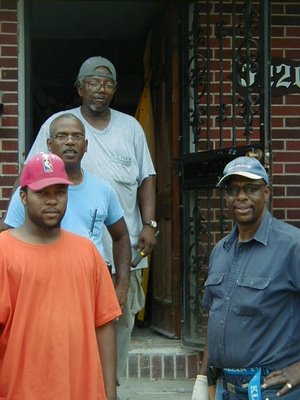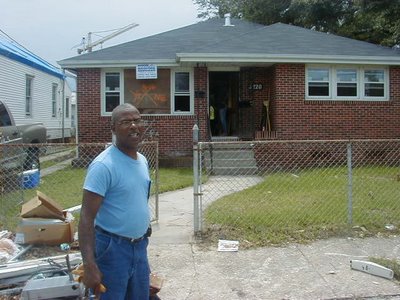For some in the Lower Ninth, a new start at life



Here they were, working on a gutted home in the Lower Ninth Ward when I stopped by. They were putting in the electric. Three out of four of them were from Chicago. They put down their tools and came outside, enthusiastic to talk. We stood on the front steps at midday. The sky was deep blue. And there was no sound in the neighborhood other than our voices. Even the main street, with its little car traffic, was probably six blocks away. Behind us as we talked was the green grass slope of a levee.
"(New Orleans after Katrina) is not about black or white," said Al Mitch (at left). "It's about do you have some skills? Do you want to work or do you not want to work? I can't see, really, going back to Chicago."
He's the tallest, a 32-year veteran of Com Ed. Before last month, Mitch was retired and happily so. He was sick of installing cable during Chicago winters. The worst was the the last time the Chicago Bears played the Super Bowl, which happened to be in New Orleans. He listened to the game on the radio and imagined the cool Delta breeze. "I had to work that day. It was two below. The Bears were here and I was freezing," he said.
Mitch, 59, was happily living in Fernwood, a South Side neighborhood, until he got a call from his friend Darryl Summers (at bottom), a contractor friend who went South in December. New Orleans, he told him, was booming. And not only were the people down there sick of the local contractors who never showed up on time, did shoddy work or didn't return phone calls, but work was plentiful for a dedicated professional and better yet, the weather all good.
Now, both men, one retired, decided to change their lives. In a matter of months, they and their wives and children will turn their back on the Midwest and call New Orleans home.
For Summers, 49, it's a homecoming. His mother is a native and he spent the summers riding the streetcar and eating the food. Compared to Chicago — a hard, ugly industrial city — New Orleans is casual, overflowing with creature comforts. "I always loved New Orleans. The people, the music, the atmosphere. You walk down the street, (the people) wave at you," he said.
While others are writing the city's obituary, Mitch sees a "new beginning." "Although it was a disaster, a person with some skills, you have a chance to explore your world, live your dreams," he said. Due to rampant price gouging opportunists — and because they are polite, professional and good — the group hasn't advertised once. They also credit their schooling in the rigid and vast matrix of Chicago code rules, which makes basic install jobs in New Orleans a piece of cake. "Chicago, it's hard. Here, you work hard, but it's not hard," Mitch explained. Plus, the micromanagement of Com Ed, something he said began to eat at him from the inside, would not exist. In New Orleans, he would be a free man.
Mitch brought with him Tiger Fairrow, 25 from Bolingbrook (in orange), his friend's nephew who is also a licensed contractor but not as sure as his elders whether he wants to stay. Right now he just likes the steady work and sunshine.
While here they rounded out the group hiring George Lloyd (top, in grey). Lloyd has his own post-Katrina plans. As soon as he can, he's moving to Buffalo, where there's family. Despite the flow of work in his native city, he has nightmares. That happens when swamp water rises as high as your neck. And you spend seven days in the Superdome, watching murder and suicide he insists happened despite investigations in the Times-Picayune that report the contrary. "Rape, murder, drugs, guns, you name it, it was in there," he said. Despite the squalor and the violence, he said he wasn't scared because he's seen it all. "I done live through all that," he said. "I was worried about the kids."
Lloyd, who before Katrina worked several jobs including at a shipyard and sterilyzing trays at a local hospital, said the breakdown was just the natural course of events. People didn't enter the Superdome ravaged. But it became apparant that there would be no resuce and no one seemed in charge. Time simply took its toll. "When you ain't got no oxygen and the power went out and it's hot, no one can eat and you're confused, naturally people are going to get disturbed," he said. "Then it turned violent."
After the Superdome, Lloyd was bused to Tulsa, Okla., but after eight days, he turned right back around. He arrived in the Lower Ninth and find his apartment building "totally gone." Today he's staying with a cousin in Kenner, a suburb.
While up on ladders, his new co-workers prod him for stories he hesitates to retell. "The little food they had, there was not enough to go around. When kids go hungry, that's a helluva thing. It shouldn't have been," he said. "It was hell in there."
Mitch said that despite the horrors that happened in this neighborhood, he's convinced things will change for the better. For that to happen, it will take a new sense of perception, trust — and patience. "Anyone who thinks it's going to change overnight is fooling themselves," he said. "It's monumental."

0 Comments:
Post a Comment
<< Home